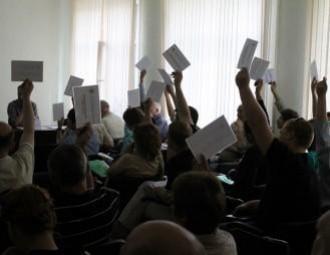Belarusan civil society organizations voiced their solidarity with the Ukrainian people
27.02.2014 | Society

The Belarusan National Platform of the Eastern Partnership Civil Society Forum, which includes more than 60 organizations, adopted an appeal “On solidarity with the Ukrainian people”.
“In these days, filled both with grief and hope, when Ukraine is experiencing a turning point in its history, we appeal to the whole Ukrainian nation with solidarity and hope.
Together with Ukraine, we mourn for the victims, the heroes who gave their lives for the universal values: freedom, democracy, humanism and justice! We will keep them in our hearts.
Life and health of the people is a very high price that the Ukrainian people paid for their freedom from unlimited and uncontrolled power. This blood could have not happen, but it has not been spilled in vain. Let it be a lesson to those who still believes that this price can be paid for staying in power and people’s lives can be given for luxuries and personal ambitions.
We admire the heroism of ordinary Ukrainian citizens, their sense of duty and responsibility, self-organization, dedication and the will to victory. Without them, ordinary peaceful people, the change would not have happened.
Ukraine is preparing for hard months of reconstruction of the country, return to normal life, formation of new relations between a state and a citizen. We believe that our good neighbor, the Ukrainian people, will be able to build a new state as a member of a large European family, based on the ideals of humanism, on the principles of democracy. The Ukrainian people deserve the right to build their country, and then there will be no place for corruption, crime, lawlessness and oppression of the people.
Glory to Ukraine!” – says the appeal of the Belarusan National Platform of the EaP CSF adopted on February 24.
-
03.01
-
07.10
-
22.09
-
17.08
-
12.08
-
30.09



























